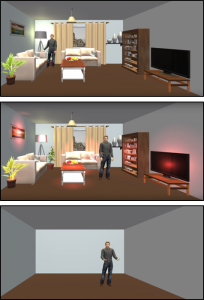Technical devices can be used most effectively to support learning processes if they take into account that different people use them in different ways. I am particularly interested in how user-related factors such as age, gender, affinity for technology or neurodiversity influence human-technology interaction and interplay with system characteristics. The resulting evidence can benefit the design of assistive technologies.
Understanding and supporting neurodivergent mechanisms in emotion regulation (2021 – present)
Being part of daily work situations can be challenging for people with neurodivergent mechanisms of perception and interpretation, particularly related to interpreting and regulating emotional responses. By developing a novel multimodal assessment and training paradigm, building up competences in the understanding and regulation of emotional states should be supported. A modular technology-supported system captures brain signals and converts derived emotional states into tangible sensory perceptions. By embedding the emerging closed feedback loop into a virtual environment, we provide a safe training space that can precisely support users’ needs. Our approach aims at contributing to social awareness and promoting empathy and mutual understanding in society.

Delayed system response in a virtual memory training (2016 – 2018)
In an interdisciplinary cooperation with colleagues from the chair of Computer Engineering and the chair of Computer Graphics and Visualization at the TU Chemnitz, we developed a computer-based memory training. It is operated via spoken dialogues, teaches the well-known “method of loci” (also known as “memory palace technique”) and features a virtual agent as a trainer. It served as a use-case for testing effects of system-induced delays on cognitive performance while taking into account individual differences. We explored the emerging effects in two Wizard-of-Oz studies with students (Wirzberger, Schmidt, Rey, & Hardt, 2017) and elderly participants (Wirzberger, Schmidt, Georgi, Hardt, Brunnett, & Rey, 2019). Results indicate a trade-off between individual preferences and cognitive effects when obtaining optimal system response times. Next steps involve the test of alternative training scenarios, the technical implementation, and comprehensive user tests with the working system.
Related publications
- *Wirzberger, M., *Schmidt, R., Georgi, M., Hardt, W., Brunnett, G., & Rey, G. D. (2019). Effects of system response delays on elderly humans’ cognitive performance in a virtual training scenario. Scientific Reports, 9:8291. https://doi.org/10.1038/s41598-019-44718-x *Authors share first authorship
- Wirzberger, M., Schmidt, R., Georgi, M., Hardt, W., Brunnett, G., & Rey, G. D. (2018). Influences of system response delay on elderly participants’ performance in a virtual memory training. In R. Wiczorek, D. Manzey, L. Onnasch, K. Brookhuis, A. Toffetti, & D. de Waard (Eds.), Annual Meeting of the Europe Chapter of the Human Factors and Ergonomics Society 2018, Technology for an Aging Society, Book of Abstracts (p. 42). Berlin.
- Wirzberger, M., Schmidt, R., Rey, G. D., & Hardt, W. (2017). Auswirkung systeminduzierter Delays auf die menschliche Gedächtnisleistung in einem virtuellen agentenbasierten Trainingssetting [Influence of system-induced delays on human memory performance in a virtual agent-based training scenario]. In M. Eibl, & M. Gaedke (Eds.). INFORMATIK 2017, Lecture Notes in Informatics (LNI) (pp. 2287-2294). Bonn: Gesellschaft für Informatik. https://doi.org/10.18420/in2017_229
